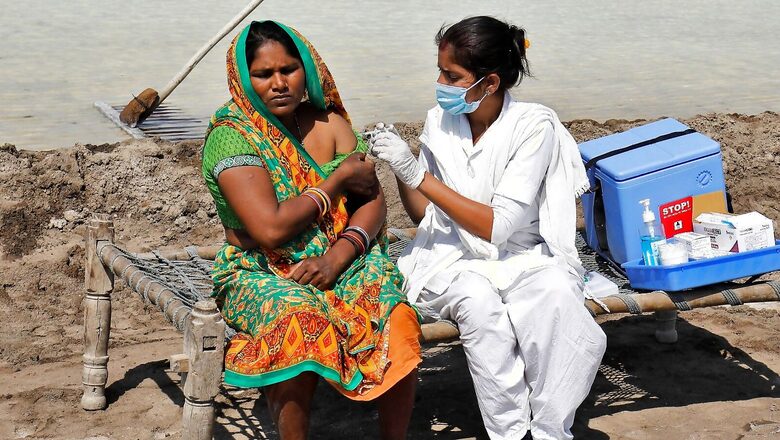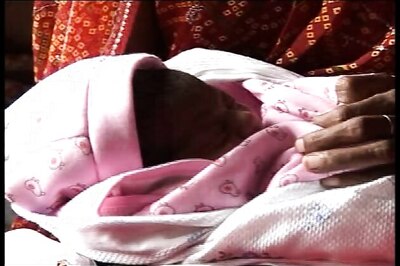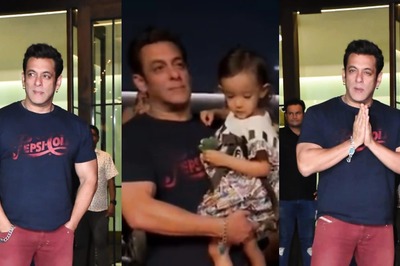
views
In 2020, the world was in a desperate situation. Everyone was looking for a cure for Covid-19. Soon, the world joined hands to find the vaccine and that was the time when all eyes were on India — the powerhouse of vaccine manufacturing since last many decades.
Data shows India produces 60% of the world’s vaccines and accounts for 60-80% of the United Nations’ annual vaccine procurement.
Indian companies such as Pune-based Serum Institute of India, and Hyderabad-based Bharat Biotech have helped over the years to produce and distribute vaccines to the world.
“The arrival of vaccines was the biggest turning point in the history of the pandemic,” Dr Rajeev Jayadevan, co-chairman of the Indian Medical Association’s national task force on coronavirus, told News18.
“Although natural immunity is now known to protect against severe disease and to some extent from future infection, in 2020 to early 2021, vaccines offered a relatively safer way of obtaining the same objective,” Jayadevan said.
In other words, the chance of a serious outcome was far smaller with a vaccine than by opting to get infected with Covid-19 in an attempt to gain immunity for the future. This was especially, true for older adults.
National Technical Advisory Group on Immunisation chief Dr NK Arora told News18, “It is the journey of Atmanirbharta, self-assurance and self-pride. From a vaccine manufacturer, we have now become vaccine developer. We have the technical competence, now, the infrastructure, to develop new vaccines with the state of art technology. Will like to thank all Indians for accepting the vaccine to make themselves, their near and dear ones and community safe.”
Anant Bhan, an adjunct professor and researcher in bioethics at Mangaluru’s Yenepoya University, said it is a “matter of pride” that India today has reached 200 crore vaccination. “This shows the potential of our health system to deliver at scale during a challenging pandemic period.”
India’s Vaccination Journey
The road to India’s vaccination journey was not very smooth. In fact, it started with harsh criticism, experts involved in the vaccination drive said.
“In the initial phase, an international publication predicted that it could take over a decade for India to vaccinate its 1.4 billion population against Covid-19,” said an official from the Ministry of Health and Family Welfare. “We proved all of them wrong in a matter of just one year.”
The Drug Controller General of India announced approval for the restricted emergency use of the novel coronavirus disease (Covid-19) vaccines manufactured by Bharat Biotech International Ltd and Serum Institute of India January 3, 2021.
India opened its vaccination drive on January 16, 2021 in a phased manner where healthcare workers and older individuals were priortised first.
“India was also a model to the world in the way it prioritised the delivery of vaccines to the most vulnerable individuals first, this was an example of optimal use of resources,” Jayadevan said while complementing the government from a social and ethical standpoint as “India never made vaccines mandatory”.
He said nobody was forced to get vaccinated or penalised for not having one. Instead, it was a voluntary process bolstered by the clear and transparent public health messaging at all levels of the healthcare system even at the grassroots level.
As expected, there was a substantial amount of vaccine hesitancy in the beginning apart from vaccine shortage, misinformation and rumours followed by challenges with registration and appointments at Co-Win platform.
By July 2021, nearly 7.5 crore individuals were fully vaccinated translating to only 5% of the Indian population being vaccinated.
However, vaccine hesitancy was not a new challenge and prevailed globally. According to a survey released by the social network LocalCircles in October 2021, approximately 7.5% of adults in India were hesitant to take Covid-19 vaccines. But one month later, the figure had grown to 12.3% and kept on growing, thereafter.
Reminders about appointments for vaccination via WhatsApp and social media chat groups, counselling, newspaper ads, and promotion of eminent doctors who have received the Covid-19 vaccine shots as influencers — multiple measures were taken by states to boost the confidence of public to come forward and take the jabs.
To fight the disbelief in our vaccines, popular politicians and public figures such as Prime Minister Narendra Modi, Minister Amit Shah, AIIMS’ director Randeep Guleria and health expert Dr VK Paul took shots in public to boost confidence.
Vaccination Drive at Grass-Root Levels
Being a country of 139 crore people, India surprised the world with its efficiency in delivering vaccines to the remotest parts of the country, experts claimed.
In fact, our grassroots level social workers including ASHA workers played a major role in implementing this and gaining the trust of people.
From reaching out to religious leaders for support to using choppers, boats and ropeways for ferrying vaccines and vaccinators, authorities in states with tough terrains, inclement weather went extra mile to provide jabs.
Health officials in states and Union Territories (UTs) such as Himachal Pradesh, Uttarakhand, Ladakh, and Jammu and Kashmir in the north, and Meghalaya in the northeast took toughest routes to reach beneficiaries.
In one instance, an inoculation camp was set up in the middle of a wildlife sanctuary.
In some states, such as in Meghalaya, state officials ended up facing obstacles with the prevalence of local dialects.
Drones were used to deliver vaccines in intractable places where there were no roads, and cycles were used for transport and in the desert, camels helped.
To vaccinate the population just 1,000 people in Himachal’s Parvati Valley-based Malana village, which is notoriously known among travellers for producing hashish or cannabis resin that is cultivated in the region, the government officers did a three-hour trek.
However, the vaccination drive was allowed by the villagers after these officials were able to convince the representatives of the deity.
In order to break the misconceptions and convince those living in the remotest part of the country, such as India’s remotest district Nuh, the government launched door-to-door vaccination campaign ‘Har Ghar Dastak’.
There the widely popular misconceptions such as “vaccines cause infertility” to “it’s an agenda to reduce population” or “vaccines lead to death” were answered and eradicated after the repeated attempts of team of healthcare workers, especially ASHA workers.
India Continues to be a Powerhouse
In a short period of two years, the vaccine and pharma companies in India developed or started manufacturing multiple vaccinations against Covid-19 including mRNA vaccine from Gennova, Serum Institute of India’s Covovax and Covishield, Biological E’s Corbevax, Johnson & Johnson’s single shot vaccine, Dr Reddy’s Sputnik V and Zydus Cadila’s ZyCoV-D among others.
Meanwhile, India has already sent more than 23 crore Covid-19 vaccines to over 50 countries in the last two years under its Vaccine Maitri initiative, data shows.
According to the data collated by Observer Research Foundation’s vaccine tracker, more than 17.30 crore doses have been sold commercially whereas 4.45 crore have been sent via commitments to the WHO-backed COVAX platform. Around 1.50 crore vaccines have been sent as grants.
What’s Next?
Going forward, Bhan advised that “India must use this experience to better understand, plan and implement public health programs for our pressing health needs.”
“India must also reflect on where we could have done better in the Covid-19 vaccination experience, and address those areas of improvement.”
Building Co-Win and using the tech solution to digitally drive the process slashed information asymmetry and democratised the process. The system can further be used to monitor several other important health parameters of country, experts claimed.
“The making of India’s own messenger RNA (mRNA) vaccine is one of the significant milestones and the technology can be tweaked faster to make variety of other vaccines,” the government official quoted above counted.
“Now is the time to consolidate our gains and learning and build on our Covid-19 experience for other public health priorities.”
Read all the Latest News, Breaking News, watch Top Videos and Live TV here.




















Comments
0 comment